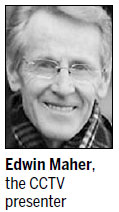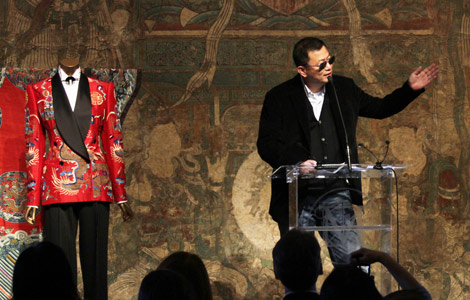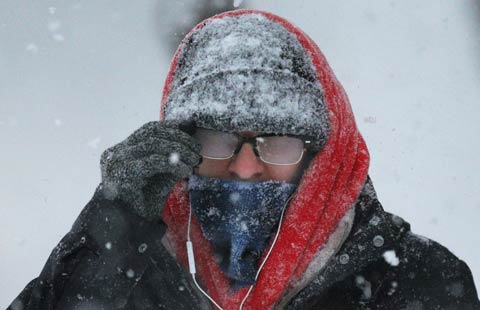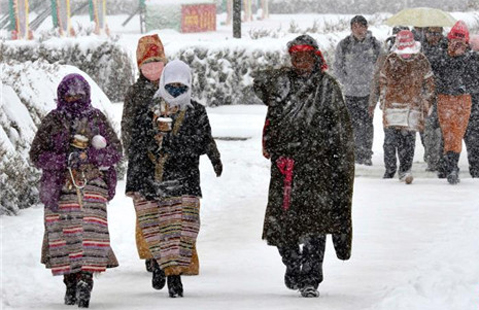How Edwin Maher became a face familiar to millions
Updated: 2015-02-18 08:08
By Mo Jingxi(China Daily)
|
||||||||
Edwin Maher has a face known to millions as he delivers the news in reassuring and informative tones which are his hallmark. The New Zealander, the first foreign news anchor on Chinese state TV when he came to Beijing nearly 12 years ago, seems as much a regular feature of many homes as the furniture.
Through him, millions of viewers have been told of the great changes taking place in China and he likens his experience here to a passenger on a high-speed train in the world's largest developing country. The attraction, he believes, lies in being unaware off just what the next destination will be for him.
He first compared living in China as akin to traveling on a high-speed train in 2007, when he received the Friendship Award, a top honor for foreigners who have contributed significantly to China's development.
"I still feel the same today," said Maher, who is also fascinated with the actual experience of traveling on high-speed trains. The geographic kaleidoscope you see from the comfort of a carriage resembles the changing economic landscape, the septuagenarian, said.
As an anchor and weatherman in Australia for 20 years, Maher came to China in his 60s after being of ered a job as the voice coach for China Radio International.
After completing a six-month contract with CRI, he became the first non-Chinese news reader on bulletins for China Central Television's English news channel.

"People around the world certainly want to get news about China," Maher said, noting the growing recognition of CCTV as an emerging competitor to other global broadcasters.
As a weatherman for the Australian Broadcasting Corp, Maher won a loyal following for the eccentricity of the pointers he used to indicate weather patterns: from an ice sculpture to carrots.
There was even an Edwin Maher Appreciation Society organized by his appreciative audience.
He also has many fans in China, especially young students who grew up with his news, which coincided with an unprecedented enthusiasm for learning English among his viewers.
For many, watching English TV programs anchored by foreigners was the most accessible way to improve their listening and pronunciation skills.
Being stopped on the street, as people recognise him and pose for photographs is not uncommon nor surprising. He is after all, a regular part of many families.
But his journey to China came after the overwhleming grief of losing his life's anchor when Robyn, his wife of 33 years, died of brain tumor in 2000, leaving Maher and three grown-up children devastated.
"From the day of the funeral, I found myself directionless," he said. The loss gave him the impetus to try pastures anew which is when he applied to CRI.
More than a decade of living in China not only saw him in a job he excels at, but also a Chinese family with whom he will soon celebrate Spring Festival.
Maher met what would become his "Chinese family", Xu Donghai and his wife Zhang Ying after their son Xu Zheng of ered him directions when he got lost soon after his arrival in China.
"When I was first invited to their apartment, it was a rare chance to go inside the home of a Chinese family, they displayed what to me was extraordinary courage and hospitality," Maher said.
The word "family" is more apt than "friend" to describe such a close connection and knowing them has given him the drive to better speak Chinese.
Q&A
Q: Who is your favorite anchor?
A: David Eades, BBC World
Q: Do you have any rituals, or habits, before you appear on TV?
A: That is an interesting question. I just like to spend time focusing on the content and breathing. Also making sure I have a bottle of lemon-flavored red tea with me in case my throat gets dry.
Q: How many words do you read on air per minute?
A: I can control the speed of my teleprompter so there is no problem. We all usually read at a similar pace which is typical of news anchoring these days - trying to be energetic and holding the attention of viewers.
Q: Apart from newsreading, what other work do you do for CCTV?
A: We usually have four days for anchoring and I also do voice coaching for Chinese writers who want to read the voiceover on their stories to improve their intonations and their delivery, rather than just reading the words.
Q: Any "accidents" during a live broadcast?
A: Anchoring Asia Today, I was reading the introduction to a story and half way through the merry sound of my mobile started playing. Trying to conceal any alarm on my face and not wanting to draw attention by reaching for the phone, I pressed my elbow discreetly against it to mute the sound.
Q: What do you think of the new CCTV building?
A: The English channel has only been there for six weeks. It's very new to us. It's a period of transition. When you are on the footpath, you look up and see, it's very big.
mojingxi@chinadaily.com.cn
(China Daily USA 02/18/2015 page9)
Most Viewed
Editor's Picks

|

|

|

|

|

|
Today's Top News
Metropolitan Museum of Art to focus on China
Reward raised for clues to Chinese family's slaying
New visa policy draws more Chinese tourists
Portland State CI ready for Spring Festival
Students debate the environment
Fireworks on Hudson tonight to usher in Chinese New Year
UN Security Council slams IS murders of 21 Egyptians
Austria on high alert following Denmark terror attacks
US Weekly

|

|















